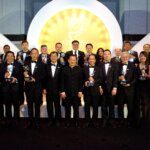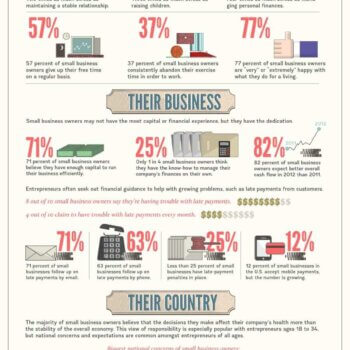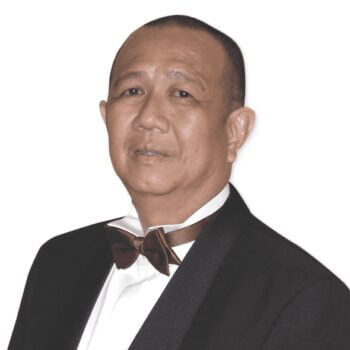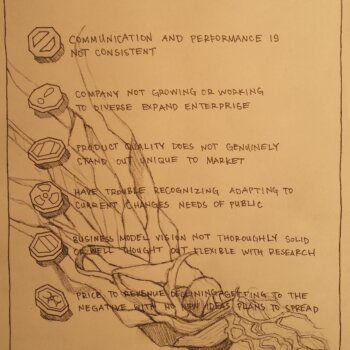Making my first $1 million, the first time I saw my wife, winning a rugby grand final, making my first $10 million – none of those milestones compare to the feeling when I learned my wife, Alicia, and I were going to be parents. Of twins, no less.
Being an entrepreneur is a rocket-ride of constant discovery. You pivot quickly when needed, grappling with unforeseen problems while trying to stay on course. That’s a pretty good description of fatherhood, too.
Here are some key lessons I’ve learned building my business while starting a family:
You won’t mind cleaning poo when it’s ‘your baby’
The hard work required to start your own business foils many wanna-be entrepreneurs before they even start. And they’re not wrong to worry — after you start your own business, if you’re awake, you’re working.
Often when you’re sleeping, too. I remember a night 12 years ago, in the early days of my entrepreneurial journey, taking a 3 a.m. Sunday phone order from the States only a couple hours after returning from the pubs. I was 21 at the time. The next thing I remember is waking after sunrise slumped over my desk, hand still on the phone and a half-written order stuck to my cheek. Not my finest customer-service moment.
But here’s where fathers know something that daydream entrepreneurs who never take the plunge will never discover: You won’t mind cleaning up crap – both at work and at home – when it’s your baby. Before the kids were born, I was terrified of the idea of changing a nappy: poo, spew and all those other bodily secretions have never really been my thing. Now, I am a shit-cleaning machine.
It’s the same when starting a business. It’s a good thing in the early days most entrepreneurs can’t afford to hire an employee – they’d quit inside two weeks dealing with all the unexpected shit you face. You slog through it, just as you slog through endless nappies and 3 a.m. feedings, because you love ‘your baby’ so much. That’s a joy you can’t know until you actually start a company or a family.
Businesses must crawl before they walk, and walk before they talk. You can imagine the day soon when they’ll be running and singing. But there are mountains of poo to cross before you get there.
Focus on what’s in front of you
Almost any new father who has strapped their newborn baby into the carseat for the first journey home from the hospital must think: How are they letting me take this child home? I have no idea how to change a nappy or how to feed them. Are they crying because they’re hungry, wet, tired or hurt? You have no idea. (The stress for newbie parents would be greatly relieved if only children were born with the power of speech.)
This is a familiar feeling if you’ve started your own business. Customer service, marketing, PR, finances, recruiting, hiring, managing – all of these things you will learn on the fly. You have zero experience until you have to do it, and then try to learn it all in a hurry (only to discover you can’t learn it all in a hurry).
But if you focus on what’s in front of you, you won’t get overwhelmed. Just as you learn to quickly diagnose every mysterious cry from your baby, you’ll learn and mature with each new learning curve you must climb with your business. Take it one step at a time.
Stephen Covey talks about distinguishing your Circle of Concern versus your the Circle of Influence in his seminal “7 Habits For Highly Effective People.” Proactive people focus on things you can control; reactive people focus on things they are concerned about which they have little or no control, like “the national debt, terrorism and the weather,” Covey notes.
When I leave the office, I focus only on the things that I have influence over in that moment… anything else that worries me, but is weighing on my mind is shelved into a place that I know to deal with tomorrow. It’s a difficult skill to master, but if you take home every issue with you every day, you will drive yourself and your family mad.
Work hat/Dad hat
Another business book that is now influencing me as a father is Edward DeBono’s “6 Thinking Hats” which is effectively a framework for putting yourself into different frames of mind (wearing different coloured hats) to analyse problems from different angles, it was in this this book that he coined the “parallel thinking” idea.
I still use this idea in the business today to gather information about problems … but now I also have a couple of different hats for “Work Tom” and “Dad Tom” … just taking a second to make a conscious decision to shift frames into another persona really helps.
You can always do things better at work and home. Try to make little improvements as a father and entrepreneur (just like you would making incremental improvements to your business). Becoming a better husband, dad, businessman all require effort, it’s really about finding that balance between the many different hats you have to wear — and worrying about the things that are important and matter now.
Stop managing, start leading
You can’t do it all. If anything, running my own business for so many years has made it more difficult for me to be the family man that I aspire to be. Personally, I have always found it difficult to work with partners, but over the years I have become better at letting others make decisions.
The biggest adjustment I’ve made since becoming a father was letting others in the business take on more responsibility. I was used to having final say on most decisions across the business. Having kids really forced me to change the way I managed people in the business, releasing the reins and empowering responsible individuals in the team to make decisions on my behalf.
In a way, becoming a father has forced me to quick being a manager, and focus on being a leader – to empower employees to take ownership of the business. It freed me to work more strategically and less tactically. Now I am focused less on operating the business as I am focusing on the future of the business. I can thank my twins for that growth as an entrepreneur.
Don’t try to ‘run’ your family
Running your own business is a pretty big deal. You are always the last person to get paid at the end of every month (sometimes not at all when times are tough). You are the person your staff will come to you when there is a problem. Your business becomes an extension of yourself – a reflection of you as a person. If things go wrong for whatever reason, it’s your reputation on the line. It’s not for the faint of heart.
Similarly, as a parent you are ultimately responsible for your family being a success or not. But if you want to have a successful family, you have no choice but to be a true 50/50 partner with your other half – to offer support when they need it and take challenges together as a family. I can’t just hammer things through when it comes to the family as everyone has an equal say in how things are run.
The best part of being an entrepreneur and a father is I can just do things without having to answer to anyone else. You get to pick your hours, whether you work from home today or not, whether you can take the afternoon off and go to the beach. The trade-off is that you are almost always connected and you often have to shift work hours into the wee hours when everyone else has gone to bed. But you don’t mind that so much if you get to spend quality time with your family. The responsibility is heavy, but the freedom is sweet.
The holidays are a busy time in the flower business, but you can bet that on December 6 – when my son, Peter, and daughter, Imogen, turn 3 – I will be home with Alicia, cell phone switched off, watching our children blow out the candles on their cake.
The next day no doubt will be busy, with dozens of emails and phone calls to return. But on that day, nothing will be more important than watching the delight in their eyes with each unwrapped present. The gifts my children give me? I get to unwrap those every morning, when they peel off the covers, wipe the sleep from their eyes and scream: “Daddy!”
written by Thomas Hagerty is founder and CEO of Ready Flowers, a market leader in online flowers and gifts. Founded in Australia and now headquartered in Hong Kong, Hagerty’s company has served half a million customers in 90 countries.





























